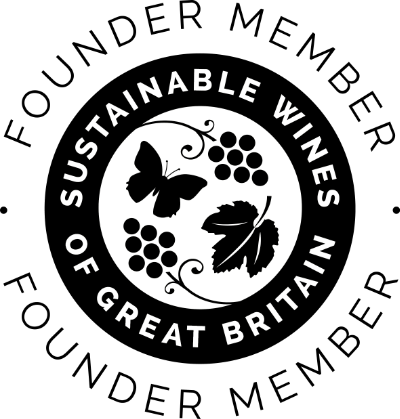No one knows Gusbourne better than our Chief Vineyard Manager and COO Jon Pollard. He's been here from day one – 3rd May 2004 to be precise, when he and founder Andrew Weeber stood surveying the landscape of fields where not a single vine had yet been planted.
For Jon, the appeal on that May day was as great as the challenge. The chance to create a brand-new vineyard from scratch is rarer than hens' teeth, and the early days of the Gusbourne enterprise were set to provide ample opportunities for Jon to prove his hands-on skills. Andrew and he would combine their energies into creating a productive vineyard on those 20 hectares (now 60) where previously oil seed rape, field beans and stubble turnips had grown.
Wine wasn't Jon's original career direction. Not surprising when a childhood in Yorkshire takes you next to Aberdeen to complete a BSc in Agriculture with the chill of the North Sea in your bones. Not even a warmer year spent travelling in New Zealand brought grapes to his attention. It took a job with a major wine retailer in London to spark that interest, followed by two years of dedicated viticulture study at Plumpton College. Then, on the grapevine, he heard that a man from South Africa was buying the Gusbourne Estate.
What forged Jon and Andrew into a team was their like-minded determination to make not just good wine but the finest sparkling wine in England. And to do so, says Jon, "by using old world techniques but with a new world head. That's the collective mission." What that means is that AOC controls, in Champagne for example, dictate many of the decisions around planting density and cropping levels. English wine, as an emerging industry, isn't constrained by such rules, allowing a greater breadth of techniques and new ways of thinking to seize upon and experiment with.
Evolving with the years
Early focus was naturally on establishing the vines. The rootstock came from nurseries across France and Germany, a 50:50 mix of Burgundian and sparkling clones so that top quality was there from the start. They also invested in mechanising the heavy lifting aspects of the job, so the young vineyard could be managed as efficiently as possible.
The three classic varietals of Chardonnay, Pinot Noir and Pinot Meunier all grow at different rates, requiring different pruning methods. "Pruning (whether single or double guyot) and canopy management are sensitive areas," explains Jon. "At Gusbourne, we favour whole-bunch picking by hand. That takes tremendous care. So another early task was to train our seasonal harvesters into skilled, trustable teams."
Having acquired a further 30 hectares in West Sussex in 2013, and as permanent staff numbers have grown, so Jon's job has evolved to managing people as well as the vines. "I'm still a crop walker, looking with a critical eye at how every vine is faring. Winemaking is a dynamic activity. We're always seeking ways to improve on the previous year."
Cow horns and Chardonnay
What of the movement towards organics and sustainability? "Our moist maritime climate means it's a struggle for English growers to go fully organic." Jon explains. "Our compost is organic, we've reduced pesticides and herbicides by 75% in recent years and we're 100% committed to regenerative agricultural soils and growing systems." Despite his respect for the biodynamic adventures of Alsace, it might be some time before you find him under a new moon burying a cow's horn full of manure beside the Chardonnay. But he's proud that Gusbourne is a certified founder member of the Sustainable Wines of Great Britain initiative.
As Jon walks the crops, Angus the Labrador in tow, his weather eye isn't always longing for sun. "I remember 2010," he says. "A difficult season. Abundant flowering, followed by seemingly endless months of ripening because of cooler conditions. But that's what made the vintage so appealing." Cooler ripening means the sugars take longer to develop, intensifying the flavour compounds in the fruit. That's the gift that Jon prepares for Head Winemaker Charlie Holland when the Gusbourne harvest comes in again from the vineyards.
You may also like...
Charlie Holland, Head Winemaker









